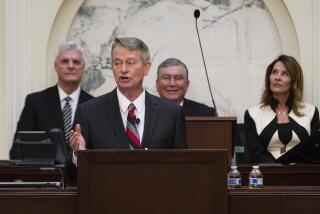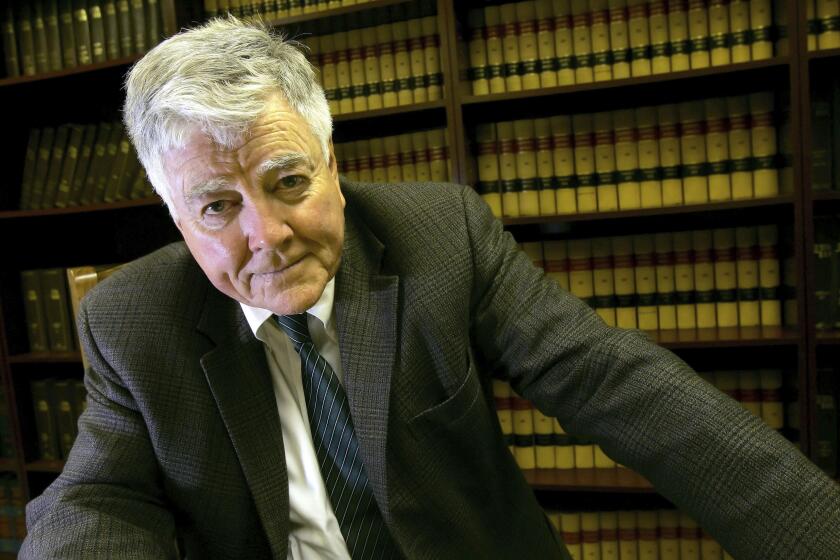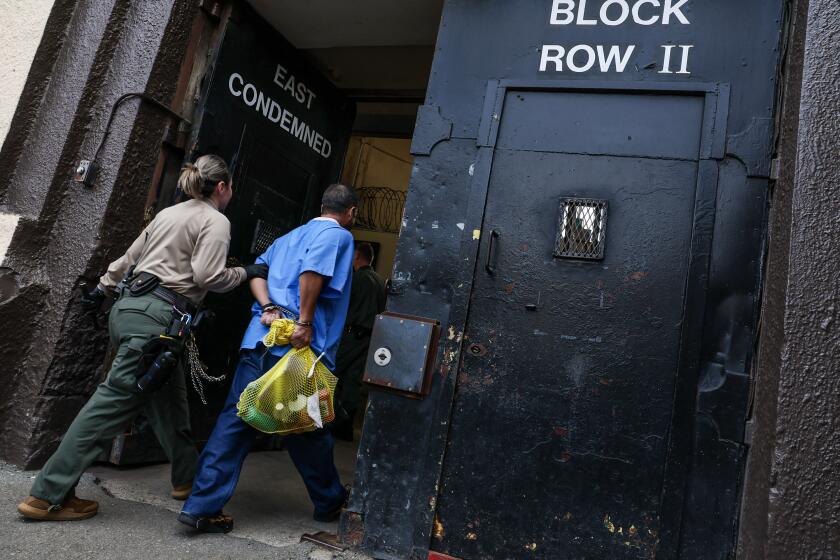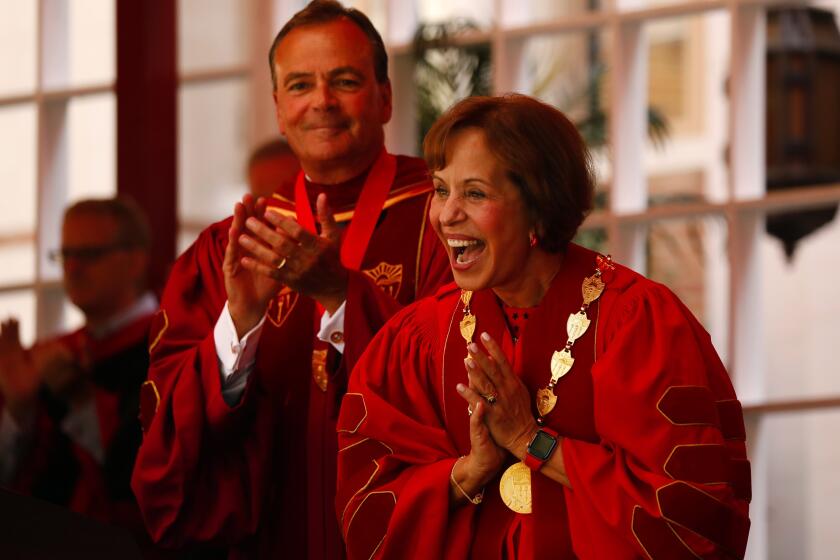Palliative care expert is a vocal opponent of Death With Dignity law
Ira Byock, one of the nation’s leading experts on hospice and palliative care, rushed into Westlake High School’s advanced anatomy classroom.
Delayed by traffic on the 405, he was late for a talk with students at the Westlake Village school about some serious stuff: dying, pain, loss. Inevitably, he knew, he’d face a question or two about assisted suicide.
------------
FOR THE RECORD
Ira Byock: In the April 6 California section, an article about Dr. Ira Byock’s opposition to “right to die” legislation said that Byock was a former director of palliative medicine at Dartmouth-Hitchcock Medical Center at Dartmouth University. The medical center is affiliated with Dartmouth College.
------------
It had been several months since a 29-year-old cancer patient, Brittany Maynard, had moved to Oregon to take advantage of that state’s Death With Dignity law — ingesting a lethal dose of drugs and jump-starting the push to legalize physician-assisted death in at least 20 states, including California.
Byock had become the public face of physicians’ discomfort with her choice.
He engaged in vigorous television and radio debates with Barbara Coombs Lee, president of Compassion and Choices, a nonprofit that supports aid in dying. He accused the advocacy group, which publicized Maynard’s story, of resorting to “Orwellian propaganda techniques.” He wrote op-eds calling aid in dying “a socially erosive response to basic human needs.”
A recent Southern California transplant, Byock had moved to head up a palliative care institute — not devote tons of time to making the case against SB 128, a state bill that would authorize doctors to write lethal prescriptions.
But today he’d take a stab at it, again.
::
Byock, 64, started off by telling the students a bit about his life and his thoughts on end-of-life care.
He grew up on the Jersey Shore, graduated from the University of Colorado medical school and completed his training at a family practice residency program in Fresno.
It was there that he first realized that dying people weren’t getting good care.
“They got lost. They weren’t attended to,” he said of the largely Latino and poor patients his hospital treated. “They’d have a liver full of cancer, and they didn’t know who would fill their pain prescription.”
In time, Byock and colleagues set up a “fledgling hospice program” to manage dying patients’ care more smoothly — making sure a coordinated team of doctors, nurses, social workers and chaplains was on call to help. He continued hospice work at his next career stop, as an emergency physician in Missoula, Mont.
Every now and then, he told the students, he would meet dying patients who told him they were “well” — and weren’t just being polite. It caught him off guard.
“The first three or four times I dismissed it. It’s the morphine, it’s the steroids, he’s a little euphoric,” Byock said.
But before long he started to look at the patients differently.
“Maybe the universe was trying to teach me something,” he said. “Maybe these assumptions about dying are not all true: that it’s the worst thing possible, that it’s always associated with suffering. Maybe it’s more interesting than that.”
Perhaps dying was a developmental phase, like toddler-hood or adolescence, he began to think — a phase in life that offered opportunity for growth.
::
The notion would guide Byock’s later career.
He wrote a now-classic book called “Dying Well”, which told the stories of a dozen patients he had treated in Missoula. It proposed that managing pain, focusing on important relationships and otherwise letting nature take its course can be a kinder path than preventing death at all costs.
Another book, “The Four Things That Matter Most,” counseled dying people to tell those closest to them these things: “Please forgive me.” “I forgive you.” “Thank you.” “I love you.”
Byock, who served a term as president of the American Academy of Hospice and Palliative Medicine, left Missoula in 2003 to become director of palliative medicine at Dartmouth–Hitchcock Medical Center at Dartmouth University.
“I consider Ira a rock star of palliative care,” said Judy Peres, an end-of-life care expert. “He’s a compassionate zealot. He has a strong belief that the system needs to do better and we need to recognize dying as a part of life.”
Providence Health & Services Chief Executive Rodney F. Hochman brought Byock to Los Angeles last year to head up the new Providence Institute for Human Caring, which will work to improve end-of-life care for patients of the healthcare system, which operates 34 hospitals in five states.
Hochman called convincing a superstar to join his outfit “a home run.”
Byock, who has family ties in the region, said he considered the move a great fit too.
“I know it’s a Catholic health system, and I’m a Jewish boy from New Jersey,” he told The Times. “But it feels very Jewish to me. This notion that we can provide excellent medical care in ways that are tender and loving. That we respect people’s inherent dignity. That there is value not just to the individual but also to family and community. That is very consistent with my upbringing.”
::
Over the course of his career, Byock got more and more involved in policy, arguing that America faces a “public health crisis” when it comes to dying.
He made that case again to the Westlake High class.
“Many, many people are getting really, really good treatments for their disease — and getting really, really bad care during the last months, weeks and days of their lives,” he told the students. “We confuse diagnosis and treatment of disease with care of human beings.”
Doctors aren’t properly trained or compensated, he said, for having discussions with patients about their preferences for treatment at the end of life. Many escalate disease treatment even when it is futile or causes suffering.
About 20% of Americans die in intensive-care units. People with no chance of a meaningful recovery, Byock said, are routinely hooked up to life-sustaining machines for treatment they never would have wanted, if only someone had talked with them about it.
To provide better deaths, he would like to see reforms like those recommended in the 2014 report “Dying in America,” released by the Institute of Medicine. It urged wider availability for hospice and palliative care, systems to improve end-of-life planning and payment incentives that would favor care that avoids visits to emergency rooms and intensive care units.
He would not like to see doctors write lethal prescriptions. He had been saying so for years.
Among his arguments:
•Physicians aren’t supposed to kill their patients.
•Even with safeguards in place, assisted suicide puts vulnerable people at risk.
•Approving the practice sends a message that it makes more sense for the medical system to kill people than to do the hard work it must to make end-of-life care more effective and humane.
Coombs Lee thinks there are limits to what such care can achieve.
“All of Dr. Byock’s palliative care goals we share — where we differ is in a narrow tenet: his belief that hospice and palliative care can ameliorate every kind of end-of-life suffering and that there is no need for the medical option of aid in dying,” she said.
“There will always be people who derive peace of mind and comfort from knowing they can avoid the suffering that is their worst nightmare. Turning over the authority to a physician who says: ‘Don’t worry, I’ll sedate you beyond consciousness’ is not enough. People who value their conscious minds want to be alert … to the end of their lives. The idea of spending 10 days, a week, or a month stuporous is not an acceptable option.”
Byock disagrees.
“Compassion and Choices has created new meanings for the word ‘dignity:’ You have to die with your boots or your makeup on to be dignified. That makes me cringe. I think it’s an exercise in marketing that is devoid of social value.”
::
For the first 30 minutes of class, Byock focused on his work in hospice and palliative care and his notion of dying well.
When he opened the floor for questions, the very first concerned assisted suicide.
What do you tell someone who wants to end their life, a student named Andrew wanted to know.
“I start by listening,” Byock said. “Tell me more. What can we do to lessen your suffering?”
He said he would tell the patient that he personally couldn’t write a lethal prescription but that he wouldn’t stand in the way if she wanted to find another physician who might.
If assisted suicide becomes legal, will medical schools teach doctors how to determine if a patient is of sound mind, another student shyly asked.
“The short answer is yes,” Byock said.
Then he sighed, and the floodgates opened.
“I think it is outrageous that medical schools are not teaching good care of people with serious illness and incurable conditions now. If the public knew what I knew about how bad the medical curriculum is, there would be an outcry,” he said.
“SB 128 will give licensed physicians in the state of California authority to write lethal prescriptions if someone is terminally ill. It doesn’t fix any of the serious curriculum deficiencies.”
Byock said that the bill — which he expects to become law — would make it easier to qualify for a lethal prescription than to get into a hospice program.
According to Medicare rules, patients must give up life-saving treatments to get access to hospice. They wouldn’t have to do so to secure a dose of death-inducing drugs. Similarly, if the condition of patients in hospice stabilizes, they will lose access to the services — but again, not to the drugs.
“That sends a message,” Byock said. “If you’re terminally ill, it’s too expensive for us to continue to give you hospice care, but here’s this medication — go take care of yourself.
“I think we’re better people than that.”
He took a breath and looked around the room at the students.
The next week, the state Senate Health Committee approved SB 128 in a 5-2 vote. A Judiciary Committee hearing on the legislation is scheduled for Tuesday.
Twitter: @LATerynbrown
More to Read
Start your day right
Sign up for Essential California for news, features and recommendations from the L.A. Times and beyond in your inbox six days a week.
You may occasionally receive promotional content from the Los Angeles Times.







